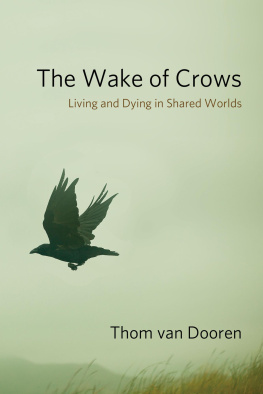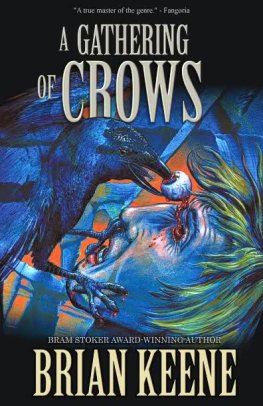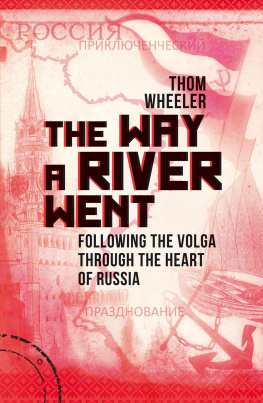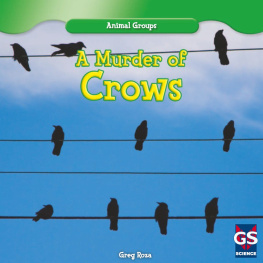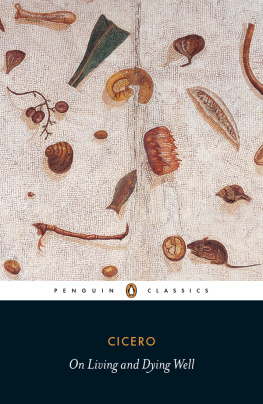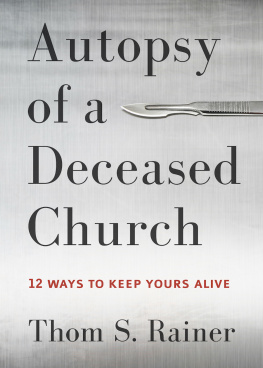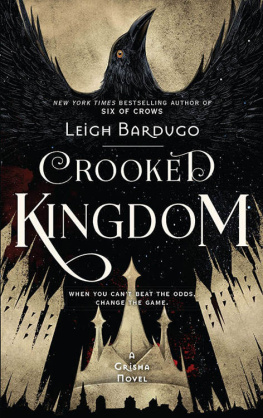Thom van Dooren - The Wake of Crows: Living and Dying in Shared Worlds
Here you can read online Thom van Dooren - The Wake of Crows: Living and Dying in Shared Worlds full text of the book (entire story) in english for free. Download pdf and epub, get meaning, cover and reviews about this ebook. year: 2019, publisher: Columbia University Press, genre: Romance novel. Description of the work, (preface) as well as reviews are available. Best literature library LitArk.com created for fans of good reading and offers a wide selection of genres:
Romance novel
Science fiction
Adventure
Detective
Science
History
Home and family
Prose
Art
Politics
Computer
Non-fiction
Religion
Business
Children
Humor
Choose a favorite category and find really read worthwhile books. Enjoy immersion in the world of imagination, feel the emotions of the characters or learn something new for yourself, make an fascinating discovery.
- Book:The Wake of Crows: Living and Dying in Shared Worlds
- Author:
- Publisher:Columbia University Press
- Genre:
- Year:2019
- Rating:4 / 5
- Favourites:Add to favourites
- Your mark:
- 80
- 1
- 2
- 3
- 4
- 5
The Wake of Crows: Living and Dying in Shared Worlds: summary, description and annotation
We offer to read an annotation, description, summary or preface (depends on what the author of the book "The Wake of Crows: Living and Dying in Shared Worlds" wrote himself). If you haven't found the necessary information about the book — write in the comments, we will try to find it.
The Wake of Crows: Living and Dying in Shared Worlds — read online for free the complete book (whole text) full work
Below is the text of the book, divided by pages. System saving the place of the last page read, allows you to conveniently read the book "The Wake of Crows: Living and Dying in Shared Worlds" online for free, without having to search again every time where you left off. Put a bookmark, and you can go to the page where you finished reading at any time.
Font size:
Interval:
Bookmark:
THE WAKE OF CROWS
CRITICAL PERSPECTIVES ON ANIMALS
CRITICAL PERSPECTIVES ON ANIMALS: THEORY, CULTURE, SCIENCE, AND LAW
Series Editors: Gary L. Francione and Gary Steiner
The emerging interdisciplinary field of animal studies seeks to shed light on the nature of animal experience and the moral status of animals in ways that overcome the limitations of traditional approaches. Recent work on animals has been characterized by an increasing recognition of the importance of crossing disciplinary boundaries and exploring the affinities as well as the differences among the approaches of fields such as philosophy, law, sociology, political theory, ethology, and literary studies to questions pertaining to animals. This recognition has brought with it an openness to rethinking the very terms of critical inquiry and the traditional assumptions about human being and its relationship to the animal world. The books published in this series seek to contribute to contemporary reflections on the basic terms and methods of critical inquiry by focusing on fundamental questions arising out of the relationships and confrontations between humans and nonhuman animals, and ultimately to enrich our appreciation of the nature and ethical significance of nonhuman animals by providing a forum for the interdisciplinary exploration of questions and problems that have traditionally been confined within narrowly circumscribed disciplinary boundaries.
The Animal Rights Debate: Abolition or Regulation? , Gary L. Francione and Robert Garner
Animal Rights Without Liberation: Applied Ethics and Human Obligations , Alasdair Cochrane
Experiencing Animal Minds: An Anthology of Animal-Human Encounters , edited by Julie A. Smith and Robert W. Mitchell
Animalia Americana: Animal Representations and Biopolitical Subjectivity , Colleen Glenney Boggs
Animal Oppression and Human Violence: Domesecration, Capitalism, and Global Conflict , David A. Nibert
Animals and the Limits of Postmodernism , Gary Steiner
Being Animal: Beasts and Boundaries in Nature Ethics , Anna L. Peterson
Flight Ways: Life and Loss at the Edge of Extinction , Thom van Dooren
Eat This Book: A Carnivores Manifesto , Dominique Lestel
Beating Hearts: Abortion and Animal Rights , Sherry F. Colb and Michael C. Dorf
THE WAKE OF CROWS
LIVING AND DYING IN SHARED WORLDS
Thom van Dooren

Columbia University Press
New York
Columbia University Press
Publishers Since 1893
New York Chichester, West Sussex
cup.columbia.edu
Copyright 2019 Columbia University Press
All rights reserved
E-ISBN 978-0-231-54439-9
Library of Congress Cataloging-in-Publication Data
Names: Van Dooren, Thom, 1980- author.
Title: The wake of crows : living and dying in shared worlds / Thom van Dooren.
Description: New York : Columbia University Press, [2019] | Series: Critical perspectives on animals: theory, culture, science, and law | Includes bibliographical references and index.
Identifiers: LCCN 2019006300 (print) | LCCN 2019008495 (ebook) | ISBN 9780231182829 (cloth : alk. paper)
Subjects: LCSH: CrowsEcology. | Human-animal relationships.
Classification: LCC QL696.P2367 (ebook) | LCC QL696.P2367 V36 2019 (print) | DDC 598.8/64dc23
LC record available at https://lccn.loc.gov/2019006300
A Columbia University Press E-book.
CUP would be pleased to hear about your reading experience with this e-book at .
Cover design: Milenda Nan Ok Lee
Cover image: Suzanne Dehne / Getty Images
For Deb, an inspiring teacher and a cherished friend
ACKNOWLEDGMENTS
This book has been the primary focus of my thinking and writing for roughly the past six years. During this time I have undertaken fieldwork in various parts of the world, had two primary academic homes, and been fortunate enough to be a visiting fellow and to present this work at a range of universities. Many people have contributed significantly to this project and to the book that it has become.
I am sincerely thankful to the colleagues who made the time to read and provide feedback on draft chapters. This commentary has been invaluable and has shaped my thinking profoundly. Particular thanks to Michelle Bastian, Etienne Benson, Brad Bolman, Veit Braun, Brett Buchanan, Matthew Chrulew, Margaret Cook, Eileen Crist, Thibault De Meyer, Vinciane Despret, David Farrier, Franklin Ginn, Margret Grebowicz, Donna Haraway, Matthew Kearnes, Lindsay Kelley, Eben Kirksey, Jean Langford, Jamie Lorimer, Stephen Muecke, Ursula Mnster, Astrida Neimanis, Emily OGorman, Craig Santos Perez, Hugo Reinert, Harriet Ritvo, Deborah Bird Rose, Isabelle Stengers, and Anna Tsing.
I would also like to thank the many talented PhD and honors students that I have worked with while completing this book. Our discussions have often taken me in productive new directions, and I have benefited immensely from all of your inspiring work: Hlne Ahlberger Le Deunff, Emily Crawford, Kate Judith, Laura McLauchlan, Jamie Wang, and Sam Widin.
This book is, in very large part, a product of my time as part of the Environmental Humanities group at the University of New South Wales. My many wonderful colleagues in this group challenged and provoked me; they introduced me to a range of new ideas and deepened my understandings of old ones. Toward the end of my time on this project I moved to the University of Sydney, where my new colleagues, in particular those in the Department of Gender and Cultural Studies and the Sydney Environment Institute, provided a stimulating and supportive home for the final stages of the work on this book.
During this period of research (20132018) I have also been fortunate enough to be able to spend extended periods of time as a visitor at the Rachel Carson Center for Environment and Society in Munich (20142016, intermittent), the KTH Environmental Humanities Laboratory in Stockholm (2014), the Anthropology Department at MIT (2018), and the Center for Pacific Islands Studies at the University of Hawaii at Mnoa (2018). Thank you to my hostsChristof Mauch, Sverker Srlin, Stefan Helmreich and Heather Paxson, and Alex Mawyerand their many colleagues for conversations, reading groups, and discussions that enriched this work in so many ways.
This book has also benefited from conversations and presentations of draft chapters during shorter visitsfrom a couple of days to a couple of weeksat many universities and other institutions around the world, often alongside or on my way to fieldwork. In particular, I would like to thank my hosts at Aarhus University, the American Museum of Natural History, Columbia University, Curtin University, cole Normale Suprieure Paris, UCLA, UC Santa Cruz, the University of Edinburgh, the University of Leeds, Universit Libre de Bruxelles, the University of Oxford, and the University of Pennsylvania.
The fieldwork that informs this book has taken me to numerous parts of the globe and brought me into conversation with many fascinating people. I cant hope to name them all here but would like to offer particular thanks to some of those who went above and beyond to show me around, to tell me their stories, or to help me in countless other ways: in Brisbane: Darryl Jones, Trixie Benbrook, Kristen Dangerfield, and Matt Brown; in Hawaii: Hannah Kihalani Springer, Mike Hadfield, Sheila Conant, Donna Ball, Paul Banko, Sam Ohu Gon III, Rich Switzer, Alan Lieberman, Nohea Kaawa, John Replogle, and Shalan Crysdale; in Hoek van Holland: Sabine Rietkerk, Harm Niesen, and Colin Ryall; in the Mojave: Tim Shields, Bill Boarman, and Roy Averill-Murray; on Rota: Stan Taisacan, Thomas Mendiola, Sarah Faegre, Phil Hannon, Beth Chagnon, Dacia Wiitala, Doug Page, and Earl Campbell. Finally, Nicola Clayton and Thomas Bugnyar both made time in their busy schedules, more than once, to meet with me and talk about corvid behavioral research. Thank you to you all.
Next pageFont size:
Interval:
Bookmark:
Similar books «The Wake of Crows: Living and Dying in Shared Worlds»
Look at similar books to The Wake of Crows: Living and Dying in Shared Worlds. We have selected literature similar in name and meaning in the hope of providing readers with more options to find new, interesting, not yet read works.
Discussion, reviews of the book The Wake of Crows: Living and Dying in Shared Worlds and just readers' own opinions. Leave your comments, write what you think about the work, its meaning or the main characters. Specify what exactly you liked and what you didn't like, and why you think so.

